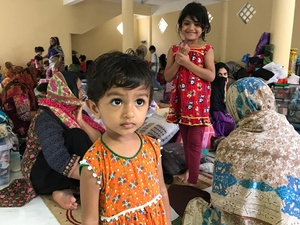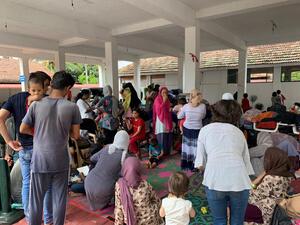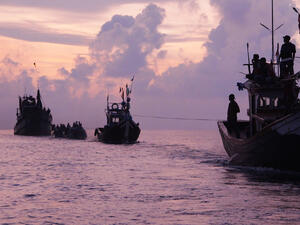First UNHCR emergency airlift flight for Sri Lanka arrives in Colombo
First UNHCR emergency airlift flight for Sri Lanka arrives in Colombo
Monday, 27 April 2009
COLOMBO, Sri Lanka - A UNHCR emergency airlift carrying humanitarian aid for tens of thousands of people displaced by fighting in north-eastern Sri Lanka began Monday morning with the arrival in Colombo of a plane carrying 2,850 family-sized tents from the refugee agency's central stockpiles in Dubai.
The giant Boeing 747 cargo plane, the first of two scheduled flights to deliver more than 200 tonnes of UNHCR tents, landed in Colombo at 10:45 a.m. local time. The family tents will be used in the north of the country to help shelter thousands of people uprooted in recent fighting between government forces and Tamil rebels.
In addition to the airlift, UNHCR is ramping up its already sizeable humanitarian operations in Sri Lanka by immediately dispatching the second emergency team to augment the agency's 120 existing staff in seven offices around the island nation. High Commissioner António Guterres also approved an increase of $ 2 million in UNHCR's budget for Sri Lankan operations helping internally displaced people. The additional funds will provide shelter, protection and other aid for civilians fleeing the conflict zone in the north.
According to the government, more than 150,000 displaced people are staying in some 38 displacement sites around the towns of Vavuniya, Jaffna and Trincomalee. Large numbers are believed to be on the move, according to the government.
Overcrowding at the camps is becoming a major worry. In one location, Menik Farm, eight to ten people are sharing shelters normally designed for four or five. Many IDPs, or internally displaced people, in the camps have no shelter from the sweltering heat.
The government has agreed to provide public buildings and more land to accommodate new arrivals in Mannar and Trincomalee, Jaffna and Vavuniya. In Trincomalee, according to the government, an area of approximately 100 acres has been identified for a site to accommodate up to 20,000 people (5,000 families). As soon as the site is ready, UNHCR will assist with emergency shelter support and the distribution of non-food items.
Aid workers also cite growing problems of malnourishment, lack of transport to move the sick to hospitals, and a shortage of medical personnel. Some of the displaced have not eaten for days.
UNHCR, which has worked in Sri Lanka since 1987, is spearheading efforts to provide shelter to people displaced by the conflict. It is also coordinating distribution of non-food items and monitoring security of the displaced.





